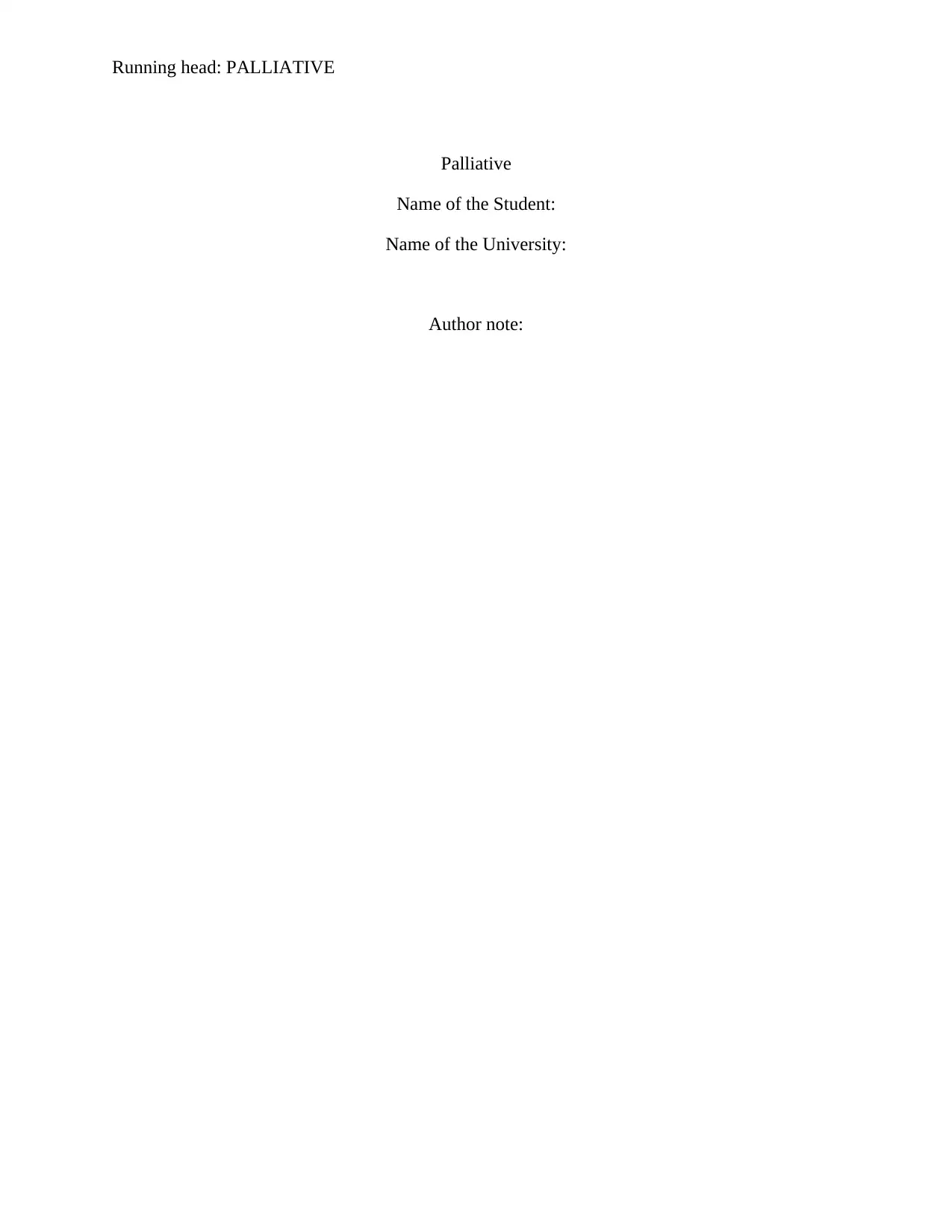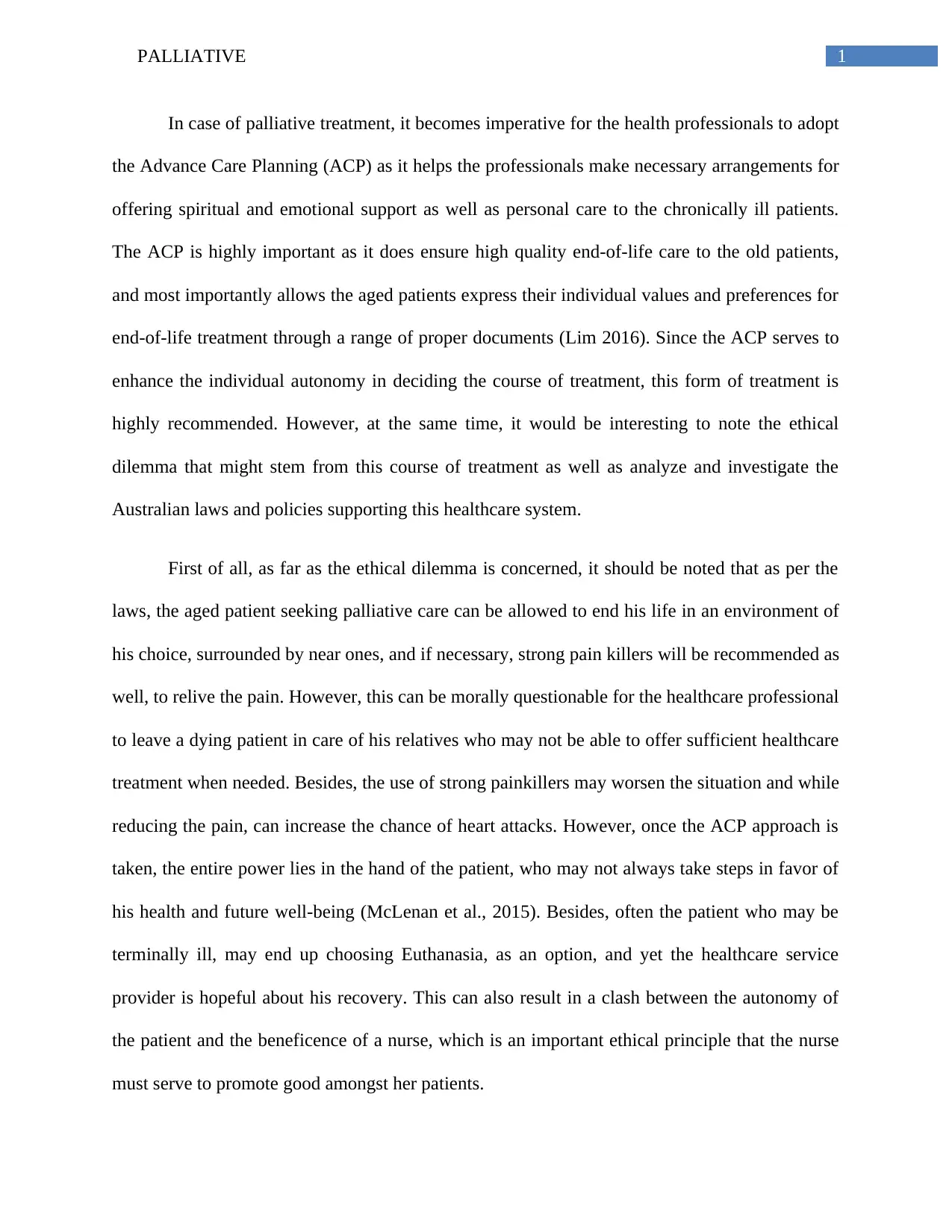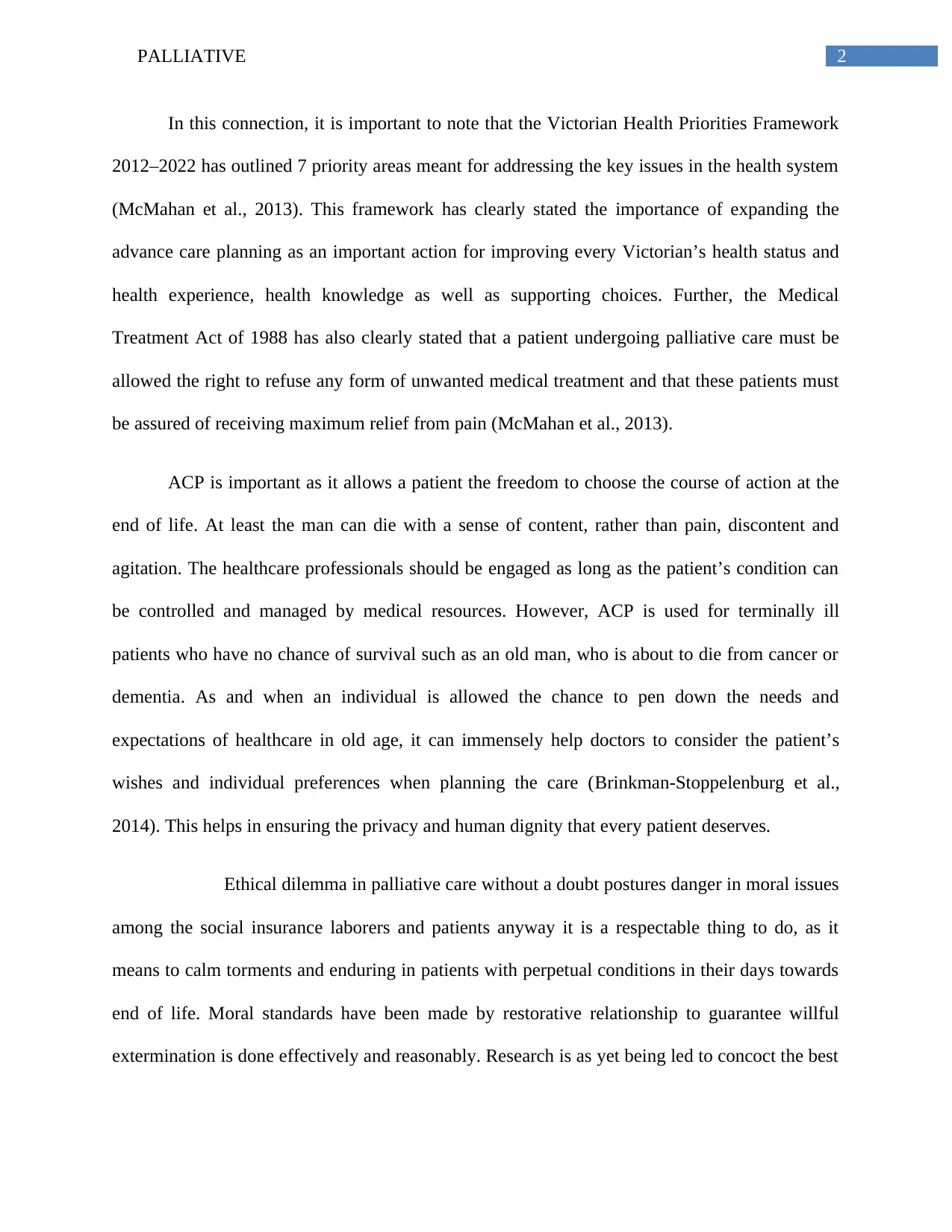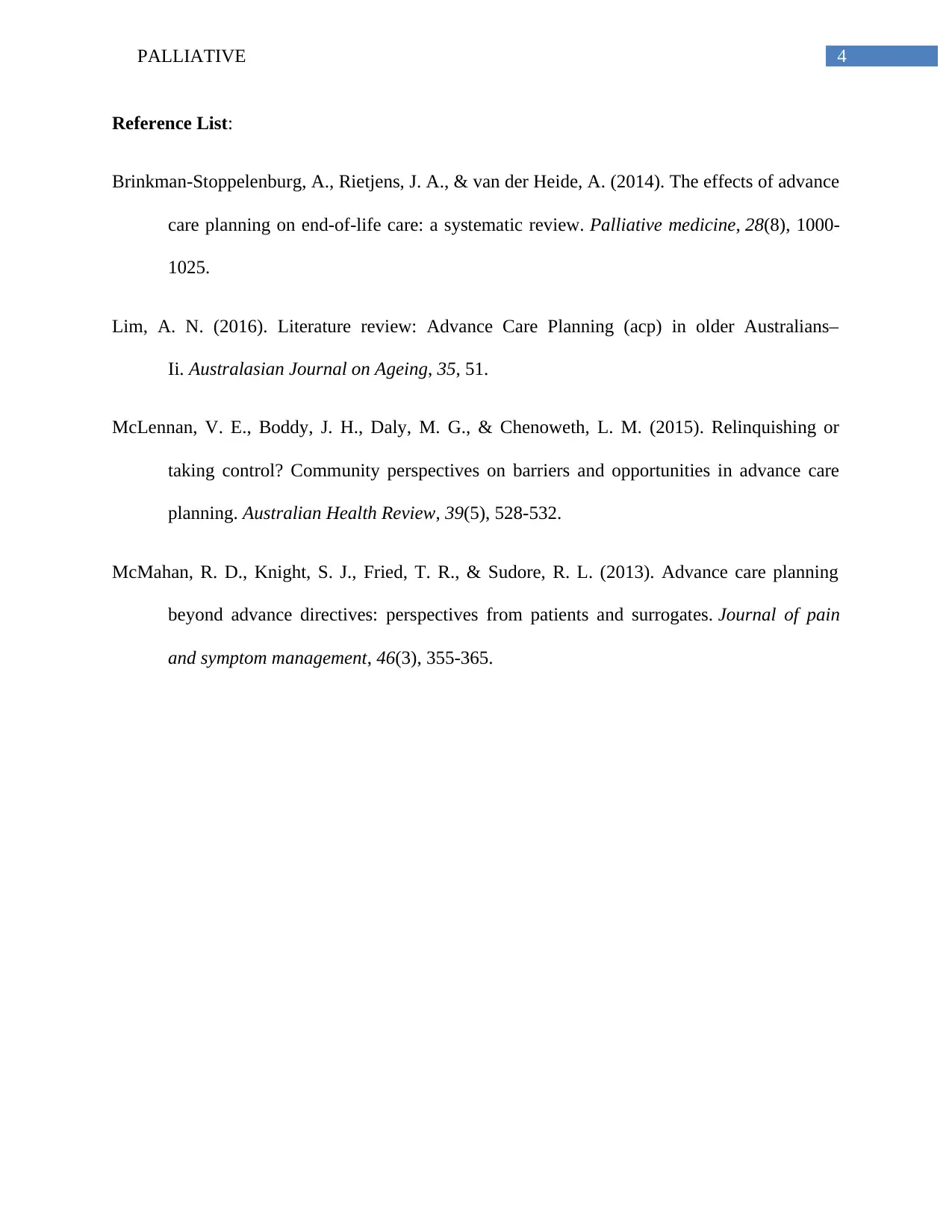Palliative Care: Ethical Dilemmas, Australian Laws, and ACP Analysis
VerifiedAdded on 2020/03/02
|5
|982
|40
Report
AI Summary
This report delves into the complexities of palliative care, emphasizing the significance of Advance Care Planning (ACP) in providing spiritual, emotional, and personal support to chronically ill patients. It highlights the importance of ACP in ensuring high-quality end-of-life care and respecting patient autonomy. The report examines ethical dilemmas, such as potential conflicts between patient autonomy and healthcare provider beneficence, and the moral implications of allowing patients to choose their end-of-life environment and treatments. It also analyzes the role of Australian laws and policies, including the Victorian Health Priorities Framework and the Medical Treatment Act of 1988, in supporting palliative care and patient rights. The report concludes by acknowledging the ethical challenges and the ongoing research aimed at improving palliative care practices.

Running head: PALLIATIVE
Palliative
Name of the Student:
Name of the University:
Author note:
Palliative
Name of the Student:
Name of the University:
Author note:
Paraphrase This Document
Need a fresh take? Get an instant paraphrase of this document with our AI Paraphraser

1PALLIATIVE
In case of palliative treatment, it becomes imperative for the health professionals to adopt
the Advance Care Planning (ACP) as it helps the professionals make necessary arrangements for
offering spiritual and emotional support as well as personal care to the chronically ill patients.
The ACP is highly important as it does ensure high quality end-of-life care to the old patients,
and most importantly allows the aged patients express their individual values and preferences for
end-of-life treatment through a range of proper documents (Lim 2016). Since the ACP serves to
enhance the individual autonomy in deciding the course of treatment, this form of treatment is
highly recommended. However, at the same time, it would be interesting to note the ethical
dilemma that might stem from this course of treatment as well as analyze and investigate the
Australian laws and policies supporting this healthcare system.
First of all, as far as the ethical dilemma is concerned, it should be noted that as per the
laws, the aged patient seeking palliative care can be allowed to end his life in an environment of
his choice, surrounded by near ones, and if necessary, strong pain killers will be recommended as
well, to relive the pain. However, this can be morally questionable for the healthcare professional
to leave a dying patient in care of his relatives who may not be able to offer sufficient healthcare
treatment when needed. Besides, the use of strong painkillers may worsen the situation and while
reducing the pain, can increase the chance of heart attacks. However, once the ACP approach is
taken, the entire power lies in the hand of the patient, who may not always take steps in favor of
his health and future well-being (McLenan et al., 2015). Besides, often the patient who may be
terminally ill, may end up choosing Euthanasia, as an option, and yet the healthcare service
provider is hopeful about his recovery. This can also result in a clash between the autonomy of
the patient and the beneficence of a nurse, which is an important ethical principle that the nurse
must serve to promote good amongst her patients.
In case of palliative treatment, it becomes imperative for the health professionals to adopt
the Advance Care Planning (ACP) as it helps the professionals make necessary arrangements for
offering spiritual and emotional support as well as personal care to the chronically ill patients.
The ACP is highly important as it does ensure high quality end-of-life care to the old patients,
and most importantly allows the aged patients express their individual values and preferences for
end-of-life treatment through a range of proper documents (Lim 2016). Since the ACP serves to
enhance the individual autonomy in deciding the course of treatment, this form of treatment is
highly recommended. However, at the same time, it would be interesting to note the ethical
dilemma that might stem from this course of treatment as well as analyze and investigate the
Australian laws and policies supporting this healthcare system.
First of all, as far as the ethical dilemma is concerned, it should be noted that as per the
laws, the aged patient seeking palliative care can be allowed to end his life in an environment of
his choice, surrounded by near ones, and if necessary, strong pain killers will be recommended as
well, to relive the pain. However, this can be morally questionable for the healthcare professional
to leave a dying patient in care of his relatives who may not be able to offer sufficient healthcare
treatment when needed. Besides, the use of strong painkillers may worsen the situation and while
reducing the pain, can increase the chance of heart attacks. However, once the ACP approach is
taken, the entire power lies in the hand of the patient, who may not always take steps in favor of
his health and future well-being (McLenan et al., 2015). Besides, often the patient who may be
terminally ill, may end up choosing Euthanasia, as an option, and yet the healthcare service
provider is hopeful about his recovery. This can also result in a clash between the autonomy of
the patient and the beneficence of a nurse, which is an important ethical principle that the nurse
must serve to promote good amongst her patients.

2PALLIATIVE
In this connection, it is important to note that the Victorian Health Priorities Framework
2012–2022 has outlined 7 priority areas meant for addressing the key issues in the health system
(McMahan et al., 2013). This framework has clearly stated the importance of expanding the
advance care planning as an important action for improving every Victorian’s health status and
health experience, health knowledge as well as supporting choices. Further, the Medical
Treatment Act of 1988 has also clearly stated that a patient undergoing palliative care must be
allowed the right to refuse any form of unwanted medical treatment and that these patients must
be assured of receiving maximum relief from pain (McMahan et al., 2013).
ACP is important as it allows a patient the freedom to choose the course of action at the
end of life. At least the man can die with a sense of content, rather than pain, discontent and
agitation. The healthcare professionals should be engaged as long as the patient’s condition can
be controlled and managed by medical resources. However, ACP is used for terminally ill
patients who have no chance of survival such as an old man, who is about to die from cancer or
dementia. As and when an individual is allowed the chance to pen down the needs and
expectations of healthcare in old age, it can immensely help doctors to consider the patient’s
wishes and individual preferences when planning the care (Brinkman-Stoppelenburg et al.,
2014). This helps in ensuring the privacy and human dignity that every patient deserves.
Ethical dilemma in palliative care without a doubt postures danger in moral issues
among the social insurance laborers and patients anyway it is a respectable thing to do, as it
means to calm torments and enduring in patients with perpetual conditions in their days towards
end of life. Moral standards have been made by restorative relationship to guarantee willful
extermination is done effectively and reasonably. Research is as yet being led to concoct the best
In this connection, it is important to note that the Victorian Health Priorities Framework
2012–2022 has outlined 7 priority areas meant for addressing the key issues in the health system
(McMahan et al., 2013). This framework has clearly stated the importance of expanding the
advance care planning as an important action for improving every Victorian’s health status and
health experience, health knowledge as well as supporting choices. Further, the Medical
Treatment Act of 1988 has also clearly stated that a patient undergoing palliative care must be
allowed the right to refuse any form of unwanted medical treatment and that these patients must
be assured of receiving maximum relief from pain (McMahan et al., 2013).
ACP is important as it allows a patient the freedom to choose the course of action at the
end of life. At least the man can die with a sense of content, rather than pain, discontent and
agitation. The healthcare professionals should be engaged as long as the patient’s condition can
be controlled and managed by medical resources. However, ACP is used for terminally ill
patients who have no chance of survival such as an old man, who is about to die from cancer or
dementia. As and when an individual is allowed the chance to pen down the needs and
expectations of healthcare in old age, it can immensely help doctors to consider the patient’s
wishes and individual preferences when planning the care (Brinkman-Stoppelenburg et al.,
2014). This helps in ensuring the privacy and human dignity that every patient deserves.
Ethical dilemma in palliative care without a doubt postures danger in moral issues
among the social insurance laborers and patients anyway it is a respectable thing to do, as it
means to calm torments and enduring in patients with perpetual conditions in their days towards
end of life. Moral standards have been made by restorative relationship to guarantee willful
extermination is done effectively and reasonably. Research is as yet being led to concoct the best
⊘ This is a preview!⊘
Do you want full access?
Subscribe today to unlock all pages.

Trusted by 1+ million students worldwide

3PALLIATIVE
practice in palliative care, as a few governments and the general public are against willful
extermination as training in palliative care.
practice in palliative care, as a few governments and the general public are against willful
extermination as training in palliative care.
Paraphrase This Document
Need a fresh take? Get an instant paraphrase of this document with our AI Paraphraser

4PALLIATIVE
Reference List:
Brinkman-Stoppelenburg, A., Rietjens, J. A., & van der Heide, A. (2014). The effects of advance
care planning on end-of-life care: a systematic review. Palliative medicine, 28(8), 1000-
1025.
Lim, A. N. (2016). Literature review: Advance Care Planning (acp) in older Australians–
Ii. Australasian Journal on Ageing, 35, 51.
McLennan, V. E., Boddy, J. H., Daly, M. G., & Chenoweth, L. M. (2015). Relinquishing or
taking control? Community perspectives on barriers and opportunities in advance care
planning. Australian Health Review, 39(5), 528-532.
McMahan, R. D., Knight, S. J., Fried, T. R., & Sudore, R. L. (2013). Advance care planning
beyond advance directives: perspectives from patients and surrogates. Journal of pain
and symptom management, 46(3), 355-365.
Reference List:
Brinkman-Stoppelenburg, A., Rietjens, J. A., & van der Heide, A. (2014). The effects of advance
care planning on end-of-life care: a systematic review. Palliative medicine, 28(8), 1000-
1025.
Lim, A. N. (2016). Literature review: Advance Care Planning (acp) in older Australians–
Ii. Australasian Journal on Ageing, 35, 51.
McLennan, V. E., Boddy, J. H., Daly, M. G., & Chenoweth, L. M. (2015). Relinquishing or
taking control? Community perspectives on barriers and opportunities in advance care
planning. Australian Health Review, 39(5), 528-532.
McMahan, R. D., Knight, S. J., Fried, T. R., & Sudore, R. L. (2013). Advance care planning
beyond advance directives: perspectives from patients and surrogates. Journal of pain
and symptom management, 46(3), 355-365.
1 out of 5
Related Documents
Your All-in-One AI-Powered Toolkit for Academic Success.
+13062052269
info@desklib.com
Available 24*7 on WhatsApp / Email
![[object Object]](/_next/static/media/star-bottom.7253800d.svg)
Unlock your academic potential
Copyright © 2020–2026 A2Z Services. All Rights Reserved. Developed and managed by ZUCOL.





